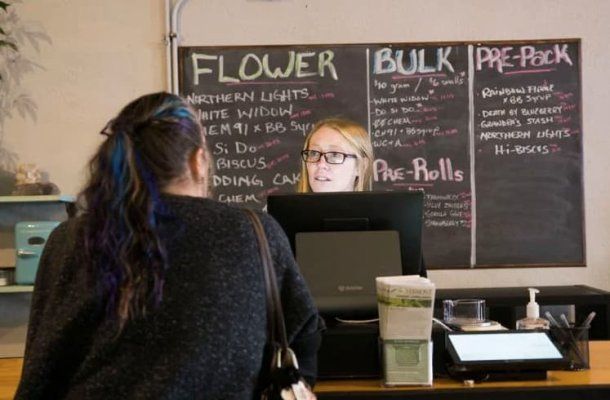Vermont's cannabis industry is closely monitoring the status of a federal bill that would allow banks to work with cannabis businesses.
The SAFER Banking Act passed out of the Senate Committee on Banking, Housing and Urban Affairs late last month. Vermont Cannabis Control Board Chairman James Pepper noted "the historic moment" at a recent board meeting while also acknowledging that "the future of the bill is still very much in the air," as there are lawmakers from both major political parties in the House and Senate who oppose the legislation.
"Although members of the House did overwhelmingly vote for the SAFE Banking Act, the bill’s earlier version, several times before, today’s vote marks the first time that Senate members have voted in favor of the measure," a Forbes article stated. "Now it’s off to the Senate and the House for more debate, amendment and votes before hopefully proceeding to President Biden’s desk. If all goes well, the banking ban that has been the scourge of the legal cannabis industry since its inception will be lifted."
If made law, the bill would allow cannabis businesses in legal states to no longer operate as cash-only enterprises.
"That will be an important moment just for the country, I think, because it really puts cannabis in the mainstream," Pepper said in an interview.
Scott Sparks, owner of Vermont Bud Barn in Brattleboro, called the issue "extremely important." He's currently banking in Oklahoma.
"I can't accept credit cards," he said. "I pay higher fees than normal businesses for all banking. Only certain payroll companies will accept my business. I could go on."
Sparks said he has hope but he doesn't think the bill will ultimately be approved by Congress.
"If they can't even pass a budget without monumental drama, how will they accomplish something like this that has tepid support, at most?" he said.
Sparks has been using Vermont State Employees Credit Union for his hemp store and grow store, Vermont Hempicurean and Vermont Grow Barn. Last year, he said, he was working on bringing his cannabis business over "but they abruptly suspended all cannabis applications, and they refused to accept me, even though I had a five-year history with them."
Even if Sparks had been accepted, he said he would have been charged 1.5 percent of deposits for having a checking account. He tried a virtual bank for a few weeks but he felt he had not been given what was sold to him so he parted ways.
Sparks then went with Brattleboro Savings & Loan. He described having "a great working relationship."
"Unfortunately a few months in, they backed out and ceased all cannabis banking," he said.
North Country Federal Union bought VSECU but it's not taking on any new cannabis accounts, Sparks said. He cited a quote for a monthly $1,575 fee per account the last time he reached out. He needs two accounts, in order to cover an indoor grow business in addition to the retail store.
Sparks said he's done lots of research and found greencheckverified.com, which he described as a broker for cannabis financial institutions and businesses.
"Banks pay fees to have them cover their compliance duties and then they get listed as cannabis friendly and vetted on their website. A cannabis business can then do research and reach out to the different banks to see if there is a fit," he said.
Sparks chose Regents Bank. He said he's "very happy with them."
However, Sparks pays $500 per month per account and his money is picked up by an armored car every week at a monthly cost of about $350. He said the fees are still much better than more local banks.
Berkshire Bank in Massachusetts recently reached out to Sparks, he said, but its fees are the same as he's paying and he would still have the same armored car pick up.
"Bottom line, I just want to be treated like a normal business," he said.
Geoffrey Pizzutillo, co-founder and executive director of the Vermont Growers Association, called the bill one of several "longstanding federal pieces of legislation that really haven't seen too much movement over the years but they've become sort of fixtures of discussion over time." He acknowledged the passage through the Senate was a big development.
"It received some really good discourse," he said.
Pizzutillo recounted testimony by Sen. Raphael Warnock, D-George, who supports destigmatizing cannabis and making it more mainstream, but couldn't support the bill because it didn't feature anything to make the drug safer for humans and reduce arrests or crime rates. Warnock believed the bill only benefited bankers and banks, Pizzutillo said.
Currently, the VGA doesn't have a position on the bill. But with any legislation, the group seeks to remove the criminal nature of cannabis.
"Until we do that, we shouldn't really advance any other policy about cannabis ... period," Pizzutillo said.
He anticipates the bill would likely benefit Vermont businesses and farms, however, he said it wouldn't allow the Small Business Administration to lend to them and there's no reform on debt card processing nor tax code prohibiting businesses from deducting otherwise ordinary business expenses from gross income associated with the “trafficking” of Schedule 1 or 2 substances.
"There's no guarantee that banks would lend to licensees," he said. "They don't have to if they don't want to."
Sen. Peter Welch, D-Vt, said in a statement to GreenMountain Cannabis News, “No legitimate small business should be forced to run entirely on cash, and that includes Vermont’s state-legal cannabis businesses. I hope the Senate can soon advance bipartisan legislation to give these businesses the banking services they need."
The SAFER Banking Act passed out of the Senate Committee on Banking, Housing and Urban Affairs late last month. Vermont Cannabis Control Board Chairman James Pepper noted "the historic moment" at a recent board meeting while also acknowledging that "the future of the bill is still very much in the air," as there are lawmakers from both major political parties in the House and Senate who oppose the legislation.
"Although members of the House did overwhelmingly vote for the SAFE Banking Act, the bill’s earlier version, several times before, today’s vote marks the first time that Senate members have voted in favor of the measure," a Forbes article stated. "Now it’s off to the Senate and the House for more debate, amendment and votes before hopefully proceeding to President Biden’s desk. If all goes well, the banking ban that has been the scourge of the legal cannabis industry since its inception will be lifted."
If made law, the bill would allow cannabis businesses in legal states to no longer operate as cash-only enterprises.
"That will be an important moment just for the country, I think, because it really puts cannabis in the mainstream," Pepper said in an interview.
Scott Sparks, owner of Vermont Bud Barn in Brattleboro, called the issue "extremely important." He's currently banking in Oklahoma.
"I can't accept credit cards," he said. "I pay higher fees than normal businesses for all banking. Only certain payroll companies will accept my business. I could go on."
Sparks said he has hope but he doesn't think the bill will ultimately be approved by Congress.
"If they can't even pass a budget without monumental drama, how will they accomplish something like this that has tepid support, at most?" he said.
Sparks has been using Vermont State Employees Credit Union for his hemp store and grow store, Vermont Hempicurean and Vermont Grow Barn. Last year, he said, he was working on bringing his cannabis business over "but they abruptly suspended all cannabis applications, and they refused to accept me, even though I had a five-year history with them."
Even if Sparks had been accepted, he said he would have been charged 1.5 percent of deposits for having a checking account. He tried a virtual bank for a few weeks but he felt he had not been given what was sold to him so he parted ways.
Sparks then went with Brattleboro Savings & Loan. He described having "a great working relationship."
"Unfortunately a few months in, they backed out and ceased all cannabis banking," he said.
North Country Federal Union bought VSECU but it's not taking on any new cannabis accounts, Sparks said. He cited a quote for a monthly $1,575 fee per account the last time he reached out. He needs two accounts, in order to cover an indoor grow business in addition to the retail store.
Sparks said he's done lots of research and found greencheckverified.com, which he described as a broker for cannabis financial institutions and businesses.
"Banks pay fees to have them cover their compliance duties and then they get listed as cannabis friendly and vetted on their website. A cannabis business can then do research and reach out to the different banks to see if there is a fit," he said.
Sparks chose Regents Bank. He said he's "very happy with them."
However, Sparks pays $500 per month per account and his money is picked up by an armored car every week at a monthly cost of about $350. He said the fees are still much better than more local banks.
Berkshire Bank in Massachusetts recently reached out to Sparks, he said, but its fees are the same as he's paying and he would still have the same armored car pick up.
"Bottom line, I just want to be treated like a normal business," he said.
Geoffrey Pizzutillo, co-founder and executive director of the Vermont Growers Association, called the bill one of several "longstanding federal pieces of legislation that really haven't seen too much movement over the years but they've become sort of fixtures of discussion over time." He acknowledged the passage through the Senate was a big development.
"It received some really good discourse," he said.
Pizzutillo recounted testimony by Sen. Raphael Warnock, D-George, who supports destigmatizing cannabis and making it more mainstream, but couldn't support the bill because it didn't feature anything to make the drug safer for humans and reduce arrests or crime rates. Warnock believed the bill only benefited bankers and banks, Pizzutillo said.
Currently, the VGA doesn't have a position on the bill. But with any legislation, the group seeks to remove the criminal nature of cannabis.
"Until we do that, we shouldn't really advance any other policy about cannabis ... period," Pizzutillo said.
He anticipates the bill would likely benefit Vermont businesses and farms, however, he said it wouldn't allow the Small Business Administration to lend to them and there's no reform on debt card processing nor tax code prohibiting businesses from deducting otherwise ordinary business expenses from gross income associated with the “trafficking” of Schedule 1 or 2 substances.
"There's no guarantee that banks would lend to licensees," he said. "They don't have to if they don't want to."
Sen. Peter Welch, D-Vt, said in a statement to GreenMountain Cannabis News, “No legitimate small business should be forced to run entirely on cash, and that includes Vermont’s state-legal cannabis businesses. I hope the Senate can soon advance bipartisan legislation to give these businesses the banking services they need."




